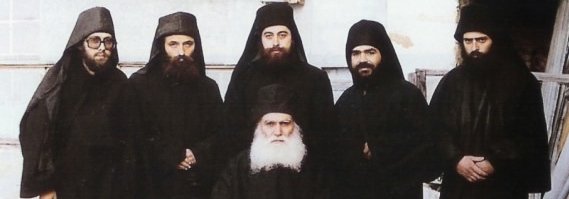Metropolitan Hierotheos's conversation with Elder Ephraim of Katounakia
 | (HERE is a short memorial to Monk Ephraim of Katounakia) Pride St. Maximos points out that the passion of pride consists of two ignorances: the ignorance oft he divine power and the ignorance of human weakness (p. 44) Essentials in the "warming of the heart" and the Jesus Prayer -Gerondas, excuse me for theinterruption. I could not follow you very well. What does it mean"he was warming up his heart?" How does the heart get warmed upand why is this work necesary for the Jesus Prayer? |
-The example of the prodigal son will help you. "But when he came to himself he said, 'How many of my father's hired servants have bread enough and some to spare, but I perish here with hunger! I will arise and go to my Father...'" (Lk.15.17-18). That is, he thought of the prosperity of his paternal home but at the same time of his own miserable state and he was prompted immediately to return to his Father. He made a great effort to force his will and desire to want the return.
We do the same for the Jesus prayer. We try to become aware of our sinfulness, of our miserable state. We see the misdeeds of the day. We examine the various events and our sins, but only on the surface, that is externally, and we feel as if we are in court and on trial. God is the judge and we are sitting on the bench of the accused. With such feelings, the cry "have mercy on me" begins. In this case we must cry, because the undistracted prayer comes through crying. The Fathers say that if one wants to obtain deep prayer and even deep monastic life, one must learn to cry and to experience self-incrimination, self-reproach, in all its intensity; to consider himself worse than any other; to consider one as a dirty animal which lives in the darkness of error and ignorance. He should be distinguished for the talent of "taking the prosecutor's part, as far as he himself is concerned", as St. Basil the great says, "he should blame himself for his sins and not wait the reproaches of the others being the plaintiff against himself, taking the prosecutor's part...". In other words he should condemn himself first, as it is said in the Proverbs of Solomon, and in this way prepare himself for prayer. St. Isaak the Syrian writes that before we start praying, we fall to our knees, put our hand behind our backs, and consider ourselves condemned. Then, a thought of self-reproach comes. Each time it may be different. We must concentrate on this thought and contemplate on it in a way that is free from phantasy. Then,indeed, the nous descends into the heart in repentance, we start crying and prayer is recited undistractedly. Let me use an example from worldly life. As soon as a man of the world remembers the offence that somebody has done against him and works on this thought, he feels a bite in his heart and begins to cry immediately. The same thing happens with him who practices the Jesus prayer, without having these worldly and selfish thoughts. He thinks: "I have grieved Christ, I have distance myself from divine grace." The heart can be wounded deeply by such a feeling. And when the heart is wounded by the spirit of repentance (not by an external force), it hurts more than a physically wounded body. This wound holds the nous in God continually, and he who is wounded cannot sleep even at night,feeling that he is sitting on burning coal.
It is possible, therefore, for him to say the Jesus prayer intensely for a quarter of an hour; and his wounded heart will remember Jesus all day and night. This is called unceasing prayer. I repeat, he can achieve this after a few minutes of intense prayer with tears and feel the energy of the Jesus prayer within himself for many days.
I must emphasize that the awareness of our unworthiness is absolutely necessary fro the Jesus prayer to act within us. Greater progress depends on greater increase of the awareness of our sinfulness. Without this awareness true prayer does not exist. So, prayer should be connected with mourning. Indeed, the Fathers teach that the ascent to heaven is connected with the descent into ourselves. The more we sink our attention deep into the soul, the more we find our secret heart; through repentance the Kingdom of heaven descends into the heart and makes it Paradise and Heaven. The exhortation, "repent, for the kingdom of heaven is at hand", (Matt. 3.2) is always in power. Only through repentance are we led to the vision of the kingdom. (p. 63-65)
